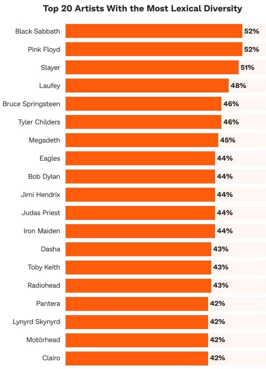Metal has been recognized as the most intellectually stimulating music genre.
The study included 10 songs from each artist, representing various musical genres. These included rock, metal, pop, country, rhythm and blues (or R’n’B), rap, and others (a total of 15). Alongside the richness of the lexical content, experts assessed the emotional tone of the lyrics and identified frequently recurring words.
Among musicians of all genres, the British band Black Sabbath emerged as the leader in lexical diversity, often regarded as one of the pioneers of heavy metal. They shared the top spot with another iconic British rock band, Pink Floyd. The lexical richness of the lyrics of both bands was evaluated at 52%.
Additionally, the list of 20 bands and individual musicians included American metal groups Slayer and Megadeth, Icelandic-Chinese jazz singer Laufey, American artist Bruce Springsteen, legendary singer-songwriter of the 60s Bob Dylan, rock band Eagles, and others.

Analysis by genre revealed that the highest lexical richness is characteristic of "metal" genre lyrics. Following this are rock, country, rap, R’n’B, pop, and electronic dance music.
Considering the temporal aspect, it was discovered that the highest level of lexical diversity—38%—is typical of song lyrics from the 70s, while the lowest—29%—is found in compositions from the 90s. Interestingly, since the early 2000s, the situation began to improve, and by the 2020s, the figure rose to 34%.
By examining the frequency of word usage in songs by different artists and genres, researchers identified the five most popular words among them: "love," "know," "time," "good," and "want."
The analysis of the emotional tone of song lyrics revealed that metal genre artists, despite their high intellectuality, had the most negative moods. The most positive genres turned out to be pop and country.
Among individual musicians, the American singer Marvin Gaye ranked first for positivity in songs, while the aforementioned group Slayer topped the negativity chart.
Since Prodigy Education specializes in educational technologies and the development of software for game-based learning, the company conducted a survey among 1,000 Americans to find out which genres positively affect adult productivity at work, as well as what their children enjoy listening to while studying.
Preferred genres for productive work turned out to be lo-fi hip-hop, or chillhop, and a style of electronic music known as "ambient." Among children, pop and rap topped the list.
It should be noted that although Prodigy Education's research results were not published in a peer-reviewed journal, scientific articles on such topics are not uncommon. For instance, Austrian and German researchers previously discovered that over the last few decades, the lyrics of English-language songs have simplified and become more uniform due to recurring words. However, this is not surprising: in another study, researchers from Curtin University (Australia) found that the simpler the lyrics are for listeners' brains to process, the more popular the songs became, often topping the music charts.